

Definition Of Digital Citizenship. The Definition Of Digital Citizenship by Terry Heick This post was originally published in 2013 and was updated in December of 2018 As more and more students interact digitally–with content, one another, and various communities–the concept of digital citizenship becomes increasingly important.
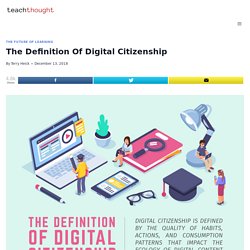
Which begs the question: what is digital citizenship? Well, first citizenship, which is formally defined as “the quality of an individual’s response to membership in a community.” So digital citizenship is nearly the same thing–“the quality of a response to membership in a digital community” would be a good first crack at the definition. Revising that might more clearly articulate the differences between physical and digital communities, so a decent definition of digital citizenship then might be “Self-monitored participation that reflects conscious interdependence with all (visible and less visible) community members” Still too wordy?
Overview. Expert insights into education for positive digital footprint development. Children and young people are spending more time online.
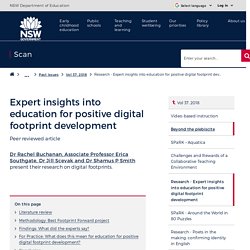
Face-to-face interactions with friends are being supplemented with digital communication. Australian children are particularly prolific users of the internet (Green et al, 2011). This online activity creates digital footprints. Digital footprint refers to the information and data that people generate, through purposive action or passive recording, when they go online (Thatcher, 2014). Digital footprints now play a role in people’s employment and educational opportunities (Black and Johnson, 2010). Many schools have yet to respond to the challenge of helping students develop reputational management skills. Help wanted: 2017 is seeking discerning digital citizens. Jenny Luca explores what it means to be global citizens in the digital age.
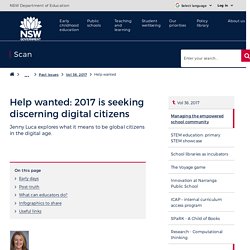
Early days If you’re of my era (quite some time ago!) , you may remember an evening in 1977 when a BBC program called Alternative 3 was aired. For two hours I sat in my lounge room, transfixed, watching a documentary that was feeding a 12 year old’s fascination for UFOs and what I now know are called conspiracy theories.
There I was, hearing of the deaths and disappearances of scientists, a mysterious lunar base that would provide a way station to Mars and the fact that interplanetary travel had been happening for years. A hoax. Never take things at face value. A good lesson to learn when you’re 12. In the context of web context: How to check out any Web page. Digital citizenship. Releases Horizon Project Strategic Brief on Digital Literacy.
A new report, supported by Adobe, aims to establish a shared vision of digital literacy and serve as a call to action for higher education leaders across the United States.
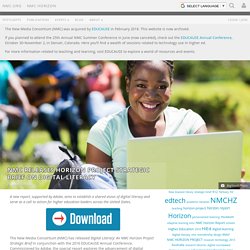
The New Media Consortium (NMC) has released Digital Literacy: An NMC Horizon Project Strategic Brief in conjunction with the 2016 EDUCAUSE Annual Conference. Commissioned by Adobe, the special report explores the advancement of digital literacy, which is sparking new thinking in higher education about how to best prepare students for the demands of the global technological economy. This project was launched because there is a lack of consensus across the field about how to define digital literacy and implement effective programs.
A survey was disseminated throughout the NMC community of higher education leaders and practitioners to understand how digital literacy initiatives are impacting their campuses. > Download the report (PDF) First visits 0. Lisa Nielsen: The Innovative Edu... Youth need privacy for healthy growth, development, and to work through ideas.
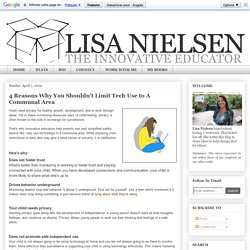
Yet in these monitoring-obsessed days of child-rearing, privacy is often thrown to the side in exchange for surveillance. That's why innovative educators help parents see past simplified safety advice like: only use technology in a communal area. While imposing such restrictions is easy and may give a false sense of security, it is ineffective. Does not foster trust What's better than monitoring is working to foster trust and staying connected with your child. Drives behavior underground Monitoring doesn't stop bad behavior, it drives it underground. Your child needs privacy Wanting privacy goes along with the development of independence. Does not promote safe independent use Your child is not always going to be using technology at home and you are not always going to be there to monitor them.
Your turn What do you think? Cyberbullying. Internet-era ways of working – Public Digital. An earlier draft of this list, stuck to the PD office door Our definition of digital says: “Applying the culture, processes, business models & technologies of the internet-era to respond to people’s raised expectations.”
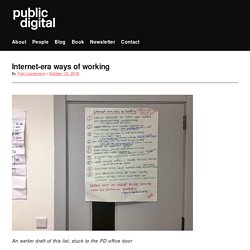
Once they’ve heard that, the next thing people always ask us is: “OK. But how? How do I make that happen in my organisation?” Good question. We’ve spent a lot of time thinking about the answer to that. Some of this will sound familiar to those of you who know the UK government design principles. So we don’t intend this list to be a replacement for the design principles. Design for user needs, not organisational convenienceUse insights from ongoing, embedded user research as your guide; make user research a team sport.Trust data over intuition. Finally: break any of these rules sooner than do anything barbaric.
This list isn’t set in stone. The internet era is still young; there’s time for all of us to get better at working in it.
DLE. Digital Habits of Learning. Enlightened Digital Citizens. Collaboration. Copyright. PLN. Digital Footprint.